Is oil & gas production a good career path? Being in the oil and gas industry can be very rewarding financially and professionally.
You can take many different career paths in the industry. They include working on the rigs to being a geologist or petroleum engineer.
Is Oil & Gas Production A Good Career Path – Main Job Roles
Yes, oil and gas production is a great career path. The industry is growing, and there are many different positions available.
The oil and gas industry salaries are usually very good, and there are often opportunities for overtime and bonuses.
However, it is essential to remember that the oil and gas industry can be hazardous. There have been many accidents and fatalities over the years.
But to ensure your safety, always follow the safety procedures that are in place.
Let’s discuss some of the different career paths you can take in the oil and gas industry.
1. Working On Rigs:
What is working on rigs? Working on rigs is one of the most common positions in the oil and gas industry.
It involves working on the drilling rig to extract oil and gas from the ground.
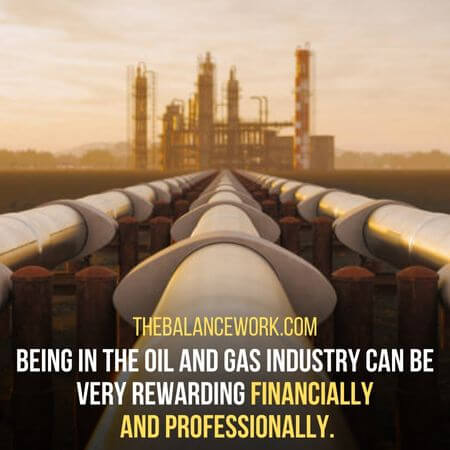
Working on rigs is a very physically demanding job, and it can be dangerous.
Due to the intensive nature of the work, workers on rigs typically work 12-hour shifts.
However, there are also opportunities for overtime and bonuses. There are no specific educational requirements for this position.
However, most companies will prefer that you have a high school diploma or equivalent.
Also, there is no average salary for this position. It can vary greatly depending on the company you work for and your experience.
2. Geologist:
Geologists play a vital role in the oil and gas industry. They are responsible for finding and evaluating new potential oil and gas reserves.
Geologists typically have a bachelor’s degree in geology or a related field. They also must have strong computer skills.
And they must be able to use different geological software programs.
For instance, they use these programs to create 3D models of the earth’s crust.
And while the average salary for a geologist is $59,007 per year. (Payscale). The top 10% make over $100,000 per year.
Geology is a great career path for someone interested in the earth and its processes.
3. Petroleum Engineer:
Petroleum engineers design and develop methods to extract oil and gas from ground.
They work in rigs’ planning and construction and other production facilities.
Petroleum engineers typically have a bachelor’s degree in engineering. But many also have a master’s degree.
And the average salary for a petroleum engineer is $101,030 per year. (Payscale)
Their day-to-day tasks can vary. But they often work with geologists and other engineers to find new reserves.
4. Drilling Engineer:
Drilling engineers plann and supervise the drilling of oil and gas wells.
They work closely with geologists to determine the best location to drill. And they also work with rig workers to ensure the drilling is done safely and efficiently.
Drilling engineers typically have a bachelor’s degree in engineering. But they have intensive knowledge of drilling operations.
The average salary for a drilling engineer is $127,110 per year. (Payscale) The pay is perfect for this position. But it is also a high-stress job.
Because there is a lot of responsibility with supervising the drilling of wells.
5. Production Engineer:
Production engineers carry out day-to-day operations of oil and gas production facilities.
They work with other engineers to optimize production. And they also troubleshoot any problems that may arise.
In the production of oil and gas, there are many processes involved. For instance, extraction, transportation, and refining.
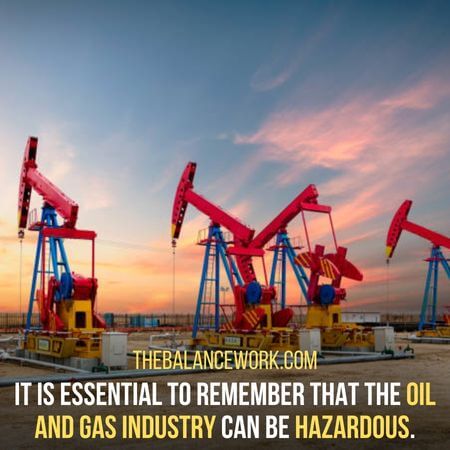
The production engineers deal with all of these processes. They enhance production and oversee the facility’s operations.
Production engineers typically have a bachelor’s degree in engineering. And the average salary for this position is $73,246 per year. (Payscale)
6. Health, Safety, and Environmental Specialist:
Health, safety, and environmental specialists are essential in the oil and gas industry.
They are responsible for ensuring that all workers are following safety protocols.
And they also work to protect the environment from any pollution from oil and gas production.
Their specialty is in environmental health and safety. And they have a bachelor’s degree in environmental science or a related field.
The average salary for this position is $65,044 per year. (Payscale)
7. Pipeline Engineer:
Pipeline engineers are responsible for planning, designing, and constructing pipelines.
Pipelines are used to transport oil and gas from production facilities to refineries.
These engineers typically have a bachelor’s degree in engineering. What sort of engineering is up to you?
Pipelines need to be designed and built to withstand the elements. And they also need to be able to transport large amounts of oil and gas without leaks.
Their vast networks and safety importance make this a perfect career path. The average salary for a senior pipeline engineer is $99,962 per year. (Payscale)
8. Reservoir Engineer:
Reservoir engineers are responsible for assessing and developing oil and gas reserves.
They work with geologists to find new reserves. And they also work on the planning and development of these reserves.
Reserves are tricky to find and even harder to develop. But the rewards can be significant.
The average salary for a reservoir engineer is $117,936 per year. (Payscale)
Geologists and reservoir engineers work very closely together. But their roles are quite different.
Geologists are responsible for finding the reserves. And reservoir engineers are responsible for developing them.
9. Equipment Operators:
Equipment operators are responsible for operating equipment used in oil and gas production.
This includes everything from trucks and bulldozers to cranes and drilling rigs.
Operators need to be very skilled in the operation of this equipment. And they also need to have a good understanding of the oil and gas production process.
The average salary for an equipment operator is $20.77 per hour. (Payscale)
10. Truck Drivers:
Truck drivers work in transporting oil and gas from production facilities to refineries.
And they also transport other materials and equipment used in production.
Truck drivers must have a valid commercial driver’s license (CDL). The license holder can drive and haul vehicles weighing over 26,000 pounds.
And they also need to have a clean driving record. The average salary for a truck driver is $58,437 per year. (Payscale)
11. Hydrographic Surveyor:
Hydrographic surveyors are responsible for surveying bodies of water.
This is important in the oil and gas industry because it helps determine the best pipeline route.
Hydrographic surveyors use special equipment to map the bottom of bodies of water.
And they also use this information to create charts and maps. The average salary for a hydrographic surveyor is $54,240 per year. (Payscale)
12. Chemical Engineer:
Chemical engineers are responsible for developing chemicals used in oil and gas industry.
This includes everything. From drilling fluid to the chemicals used in the refining process.
Chemicals are a big part of the oil and gas industry. And they play a vital role in the production process.
The average salary for a chemical engineer is $77,106 per year. (Payscale)
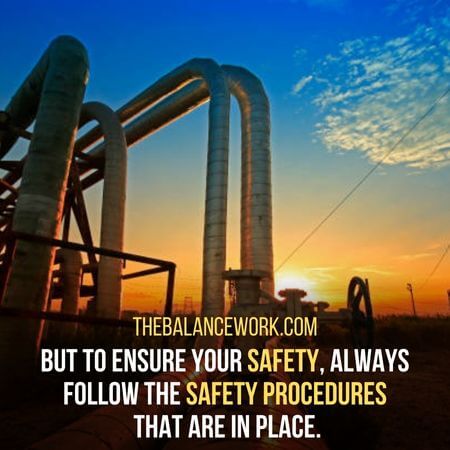
So here are 12 careers in the oil and gas industry. As you can see, there are many different types of jobs available.
And there is something for everyone. Whether you are into engineering or truck driving, there is a career path for you.
Is oil & gas production a good career path? The oil and gas industry is a great place to start your career. And it is a great place to build a career.
What Are Positive Aspects of the Oil and Gas Industry
The oil and gas industry is a great place to work. There are many positive aspects of working in the oil and gas industry.
Some of the positive aspects of working in the oil and gas industry are:
1. Good Pay:
Engineers usually start their careers in the oil and gas industry with a good salary. And as they gain experience, their salary increases.
Thus, oil and gas engineers are some of the highest-paid engineers. Their expertise is in great demand, and they get paid well for their services.
2. Job Security:
The oil and gas industry is stable. It is not prone to the ups and downs of the economy.
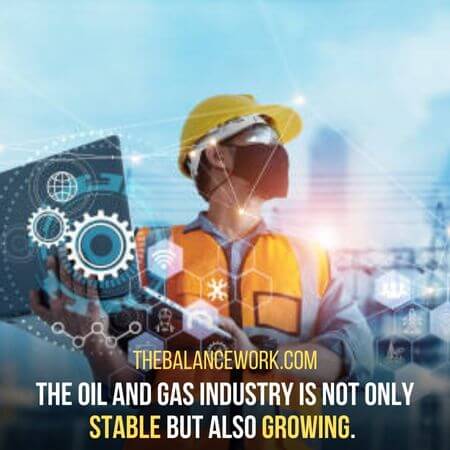
This means that there is job security in the oil and gas industry. And this is a big plus for anyone looking for a stable career.
The oil and gas industry is not only stable but also growing. The demand for oil and gas is increasing all over the world.
3. Opportunities to Travel:
Many oil and gas jobs require travel. This is an excellent opportunity to see different parts of the world.
Many people are working in the oil and gas industry travel to different countries. And they get to experience different cultures.
And this is a big plus for anyone who loves to travel.
Are There Any Negative Aspects of the Oil and Gas Industry
Like any other industry, working in the oil and gas industry has some negative aspects.
Some of the negative aspects of working in the oil and gas industry are:
1. Health and Safety Risks:
Working in the oil and gas industry can be dangerous. Many health and safety risks come with working in the oil and gas industry.
For instance, there is a risk of getting exposed to toxic chemicals. There is also a risk of getting injured in an accident.
Or, you could even get killed. The extraction points, where the oil and gas get extracted from the earth, can be hazardous places to work.
They are close to the earth’s surface and often in remote areas. This means there is a risk of getting injured or killed in an accident.
2. Working Conditions:
The working conditions in the oil and gas industry can be challenging. For instance, you will often work in challenging circumstances.
Such as, in the desert, in the cold, or the heat. Many oil and gas jobs are in remote areas.
This means that you will be away from your family and friends for long periods.
3. Long Hours:
Many oil and gas jobs require long hours. For instance, you may work 12-hour shifts.
Or, you may work overtime. This can be tough on your family life.
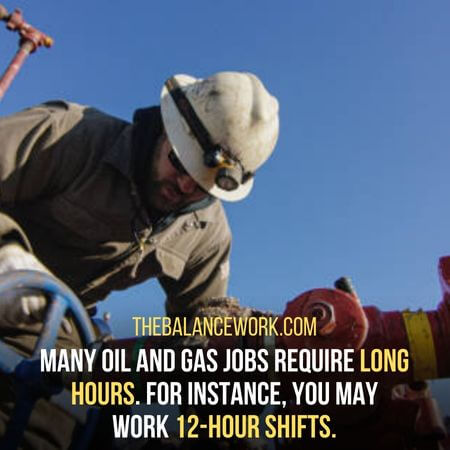
And the stress of working long hours can take a toll on your health.
So, these are some of the positive and negative aspects of working in the oil and gas industry.
As you can see, working in the oil and gas industry has both positive and negative aspects.
So is oil & gas production a good career path? It is up to you to decide. The oil and gas industry has many significant aspects.
But it also has some negative aspects. You need to decide if the positive aspects outweigh the negative aspects.
Skills Needed For A Career In Oil & Gas
If you are considering a career in oil and gas, there are some skills that you will need.
Some of the skills that you will need for a career in oil and gas are:
1. Engineering Skills:
You must have engineering skills to work in the oil and gas industry.
This is because many jobs in the oil and gas industry require a degree in engineering.
Engineering principles used in oil and gas are exploration, extraction, and production.
And the techniques used in the oil and gas industry are constantly changing. So, you will need to be able to adapt to change.
2. Science Skills:
Technicality is essential in the oil and gas industry. You will need to have a good understanding of science.
This is because many jobs in the oil and gas industry require a degree in science.

Such as chemistry, physics, or geology. And you will need to be able to understand and use scientific equipment.
Without technical skills, working in the oil and gas industry will be challenging.
3. Mathematics Skills:
Mathematics and statistics play a significant role in the oil and gas industry. You will need to be able to understand and use mathematical concepts.
Also, you will need to know the concepts of calculus, statistics, and trigonometry.
You will also need to be able to use mathematical software.
4. Problem-Solving:
You will often face problems that you will need to solve. For instance, you may need to find a way to extract oil from a problematic location.
Or, you may need to find a way to reduce the environmental impact of oil and gas production.
So, you will need to have good problem-solving skills. Another instance, you will use problem-solving skills when there is an accident.
You will need to find a way to solve the problem and prevent it from happening again.
5. Effective Communication:
Without effective communication, working in the oil and gas industry will be challenging.
You must communicate with co–workers, clients, and other professionals.
You will need to be able to explain your ideas clearly. And you will need to be able to listen to others.
The locations of many oil and gas jobs are remote. So, you will need to be able to communicate effectively through technology.
6. Leadership:
Some jobs in the oil and gas industry will require you to take on a leadership role.
For instance, you may manage a team of workers. Or, you may lead a project.
So, you will need to have good leadership skills.
7. Analytical:
You will need to be able to collect data and information. And you will need to be able to analyze it.
This is because data and information helps to make decisions in the oil and gas industry.
For instance, you may need to analyze data to find a new oil field. Or, you may need to analyze data to find a way to reduce costs.
8. Computer Skills:
In the oil and gas industry, you will need to use computers. For instance, you may need computer-aided design (CAD) software.
Or, you may need to use geographic information system (GIS) software. You can learn how to use these software programs.
Also, it will be helpful if you already have some experience using them.
So these are some of the skills you will need for a career in oil and gas. Do you have what it takes to work in the oil and gas industry?
Final Thoughts:
Is oil and gas production a good career path? The oil and gas industry is stable. The job roles are primarily technical and require specific skill sets.
The industry offers good job security and the potential for high earnings. It is a good career path for those interested in the industry’s technical aspects.
Last Updated on 1 year by Shahzaib Arshad
- Why Does My Boss Wink At Me? 6 Potential Reasons - October 5, 2023
- Is It Legal For Your Employer To Call Your Doctor? No, But… - October 4, 2023
- 12 Ways To Deal With A Low IQ Person - September 22, 2023